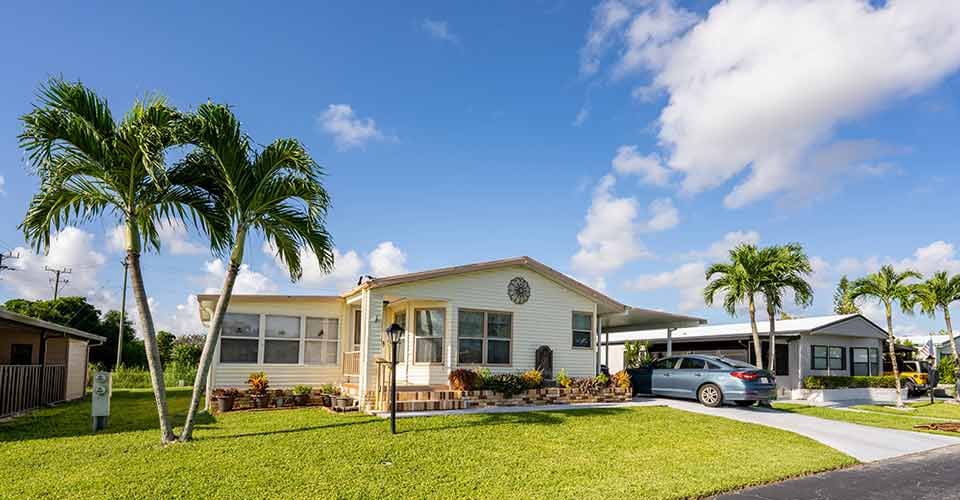FHA, VA, and Conventional Mobile Home Financing in Florida
As housing prices continue to climb in Florida, mobile homes, also known as manufactured homes, present a promising alternative with their affordability and flexibility.
Compared to conventional houses, these factory-built dwellings offer a more budget-friendly option, with an average cost of approximately $87,600.
The beauty of manufactured homes lies in their customizability, which allows you to personalize them just like traditional houses.
Depending on your chosen model, you can enjoy more than 2,000 square feet of living space, providing ample room for comfortable living.

However, if you're looking to finance a mobile home purchase, securing a mortgage from traditional lenders might not be an option.
Nevertheless, fret not, as there are alternative avenues available we can explore.
Conventional Financing
In Florida, purchasing a manufactured home can be made easier with conventional financing options.
With as little as a 5% down payment and the inclusion of private mortgage insurance (PMI), you can become a proud owner of a factory-built home.
Alternatively, if you are eyeing a second home, conventional financing allows for a down payment as low as 10%.
The guidelines set by the U.S. Department of Housing and Urban Development (HUD) on October 20th, 2008, are applicable not only to conventional financing but also extend to FHA and VA financing options.
This ensures a standardized and regulated approach to financing manufactured homes.
If you currently own a manufactured home and wish to access the equity, a cash-out refinance option allows you to borrow up to 65% of the home's value.
However, the maximum term for a cash-out refinance is limited to 20 years.
Excitingly, for conventional financing, the need for an engineer's inspection of tie downs or skirting is no longer mandatory if no additions like decking or awnings have been made to the home.
This streamlines the financing process and offers added convenience to potential buyers.
FHA Financing
With FHA financing, the minimum down payment requirement is only 3.5%, making it an attractive option for potential buyers.
To be eligible for this financing, you must plan to occupy the manufactured home as your primary residence.
Similar to conventional and VA financing, the property must comply with the current HUD guidelines for manufactured homes to qualify for FHA financing.
These guidelines ensure the property meets essential safety and quality standards.
It's essential to consider the regulations concerning the distance of the septic system, well, and drain field from the property line.
Specifically, the well must maintain a minimum distance of 10 feet from the property line, 50 feet from the septic tank, and 100 feet from the septic tank drain field.
However, local authorities may permit a reduction to 75 feet if deemed appropriate. In cases where the property line is adjacent to residential property, local well distance requirements take precedence over the guidelines.
Nevertheless, if the property is next to a non-residential property, the minimum distance requirement remains at 10 feet.
For those who currently own a manufactured home and wish to access its equity, our FHA financing option allows for cash-out refinancing of up to 80% of the home's value.
Additionally, borrowers can enjoy a comfortable 30-year term for the loan, providing greater flexibility in managing finances.
VA Financing
This unique benefit sets VA financing apart, making it an appealing option for those who have served our country.
When acquiring any home with a well, the VA mandates that both a bacteria water test and a lead water test be conducted.
The good news is that veterans are now allowed to cover the costs of these tests, whereas they were previously not permitted to do so.
Unlike FHA or conventional financing, our VA financing program does not require an engineer's inspection of the property to ensure compliance with the current HUD guidelines for manufactured homes.
This simplifies the process and reduces potential hurdles for veterans seeking financing.
Furthermore, veterans can leverage their VA entitlement to purchase a manufactured home, even if it has been moved once.
This flexibility sets VA financing apart, providing veterans with more opportunities to own their dream home.
We are proud to offer such advantageous benefits to those who have served, making VA financing an excellent option for veterans looking to secure their own piece of Florida's paradise.
Chattel Loans
In Florida, a chattel loan provides a unique financing option specifically tailored for purchasing mobile homes.
This specialized personal property loan is commonly used for financing expensive assets like planes, boats, mobile homes, or farm equipment, where the property itself serves as collateral for the loan.
One of the significant advantages of a chattel loan is that you may qualify for financing even if you don't own the land where your mobile home will be located.
This makes chattel loans a popular choice for buyers who plan to lease a lot in a manufactured home community.
Certain lenders offer chattel loans for manufactured home purchases that are insured by federal agencies such as the Federal Housing Administration (FHA), the U.S. Department of Veterans Affairs (VA), and the Rural Housing Service (RHS) through the U.S. Department of Agriculture.
While some lenders offer both chattel loans and traditional mortgages, it's essential to understand the differences between these two loan types.
Chattel loans typically come with higher interest rates, usually ranging from 0.5 to 5 percentage points higher than traditional mortgage rates.
However, they often have shorter terms, which could result in higher monthly payments but enable you to pay off the debt more quickly.
Another benefit of chattel loans is a faster and less restrictive closing process compared to traditional mortgages.
In summary, if you are considering purchasing a mobile home in Florida and do not own the land, a chattel loan can provide a viable financing option, offering more flexibility and a quicker closing process, albeit at higher interest rates compared to traditional mortgages.
Manufactured Home Guidelines
Our manufactured home financing guidelines are designed to ensure a smooth and straightforward process for our customers.
To qualify for financing, both the manufactured home (MFH) and the land must have joint titles and be classified as real property.
Our financing options are available for primary and second homes only, with no investment properties eligible.
We accept both Double Wides and Single Wides; however, Single Wides must be used as primary residences.
It's important to note that MFH homes that have been previously moved are ineligible for financing, except when utilizing VA financing.
To be eligible for financing, certain requirements must be met. The towing hitch, wheels, and axles must be removed from the manufactured home.
Additionally, a minimum living area of 600 square feet is required, and the home must be affixed to a permanent foundation (tied downs are acceptable).
To ensure safety and compliance, MFHs built before June 15th, 1976, are not eligible for financing. The appraisal process must include form 1004C, which should clearly display a photo of the HUD Certification Tag.
Regarding the land, it must be owned as Fee Simple. Leaseholds and MFH Condo lots are ineligible, and we do not provide financing for co-ops.
For conventional financing, automated underwriting approval is mandatory. The DU (Desktop Underwriter) must explicitly indicate the structure as a Manufactured Home.
However, for FHA and VA loans, manual underwrites are allowed.
Applicants must meet certain credit score requirements - a minimum of 620 FICO for conventional financing, and a minimum score of 600 for FHA and VA loans.
The maximum Loan-to-Value (LTV) ratio follows agency guidelines, and for second homes, a maximum 90% LTV is allowed.
Structural foundation certification is generally not required unless the appraiser notes any issues or deems it necessary.
However, if changes were made to the original structure (such as adding a porch or altering the roofline), or if the appraiser identifies any concerns, a structural engineer certification may be required.
Differences Between Mobile, Modular and Manufactured Homes
In Florida, the terms mobile, manufactured, and modular homes are sometimes used interchangeably, but it's essential to understand their distinctions.
While they share similarities, there are significant differences among them.
Mobile home
A mobile home is constructed in a factory and later transported to the intended property for installation.
It may utilize metal tie-downs instead of a conventional foundation, though this characteristic can also be found in manufactured homes.
The classification of a house as a mobile home depends on its construction date. Those built in a factory before June 15, 1976, fall under this category.
This date coincides with the implementation of the National Manufactured Housing Construction and Safety Standards Act by the U.S. Department of Housing and Urban Development (HUD).
Following this date, new safety standards were introduced, leading to a different designation for such homes.
Key Features
-
Manufactured before June 15, 1976.
-
Constructed in a factory and fully assembled before being transported to the property.
-
Often built on a metal frame rather than having a crawl space or basement.
-
May be secured with tie downs instead of a permanent foundation.
-
Average cost - $10,000 to $50,000.
- Typical sizes - Single wide (approximately 500 to 1,000 square feet) or double wide (around 1,000 to 2,200 square feet).
Manufactured Home
Similar to mobile homes, manufactured homes are also constructed in a factory setting.
However, they can be permanently installed on blocks, metal piers, or a traditional foundation. Unlike mobile homes, once set up, manufactured homes are not intended to be moved.
According to the Housing Act of 1980, factory-built homes constructed on or after June 15, 1976, fall under the category of manufactured homes.
These homes are subject to strict regulation by HUD under the Manufactured Home Construction and Safety Standards (HUD Code).
Additionally, they must adhere to local building standards for the specific communities where they will be located.
Manufacturers need to obtain approval for their designs from a HUD-approved Design Approval Primary Inspection Agency, ensuring safety and compliance with the law.
Key Features
-
Built after June 15, 1976.
-
Constructed in a factory and fully assembled before being transported to the property.
-
Often built on a metal frame rather than having a crawl space or basement.
-
May be secured with tie downs instead of a permanent foundation.
-
Average cost - $87,600.
-
Typical sizes - Single wide (approximately 500 to 1,000 square feet) or double wide (around 1,000 to 2,200 square feet).
- Best for - Individuals seeking a new home with minimal setup or building required on-site.
Modular Home
Similar to mobile and manufactured homes, modular homes are also built in a factory but offer more similarities to traditional homes. They often come with crawl spaces or basements and utilize a standard foundation.
Modular homes are delivered in two or more modules and assembled on-site in the desired arrangement. Local contractors oversee the process of joining these multiple pieces to complete the home's construction.
They must meet the same state, local, or regional building codes as site-built homes.
Key Features
-
Usually delivered to the property in multiple pieces and requires some construction on-site.
-
Typically built on a crawl space or basement.
-
Resemble traditionally-built homes in size and features.
-
Average cost - $270,000.
-
Typical sizes - Typically 900 square feet to 2,000 square feet.
- Best for - Individuals seeking a traditional style home with customizable features at a more affordable price.
In Florida, it's crucial to discern the distinctions between mobile, manufactured, and modular homes, as they offer different features and benefits.
In summary, understanding the differences between mobile, manufactured, and modular homes will help you make the right choice for your housing needs in Florida.
Steps for Getting Mobile Home Financing
If you're considering financing a mobile home in Florida, here are the steps to follow to get the best financing:
-
Check your credit reports - Before applying for financing, review your credit reports from Experian, TransUnion, and Equifax. Ensure that your credit history is clean and your credit score is solid, as this will improve your chances of getting favorable rates and terms from lenders.
-
Decide whether you're buying land - Determine whether you'll be purchasing the land along with the mobile home. Owning the land and having the mobile home permanently set up may make it easier to secure financing from various lenders.
-
Specify the home you want to purchase - Be clear about the type of mobile home you want to buy, as this will impact your eligibility for different loans. Certain loan types, like FHA, have specific criteria based on the type and value of the home.
-
Explore financing options - Research and compare different lenders' offerings to find the best financing option for your needs. Look for loans with low fees and interest rates to minimize your expenses over the loan's lifespan.
- Submit your loan application - Ensure your loan application is complete and transparent. Many lenders may also require a down payment, so be prepared to make one when you submit your application.
By following these steps and being well-prepared, you increase your chances of securing the best rates and terms for financing your mobile home in Florida, making the process smoother and more favorable for you.
Reach out to MakeFloridaYourHome and secure your dream home today.
With over 50 years of mortgage industry experience, we are here to help you achieve the American dream of owning a home. We strive to provide the best education before, during, and after you buy a home. Our advice is based on experience with Phil Ganz and Team closing over One billion dollars and helping countless families.

About Author - Phil Ganz
Phil Ganz has over 20+ years of experience in the residential financing space. With over a billion dollars of funded loans, Phil helps homebuyers configure the perfect mortgage plan. Whether it's your first home, a complex multiple-property purchase, or anything in between, Phil has the experience to help you achieve your goals.


 By
By  Edited by
Edited by 






